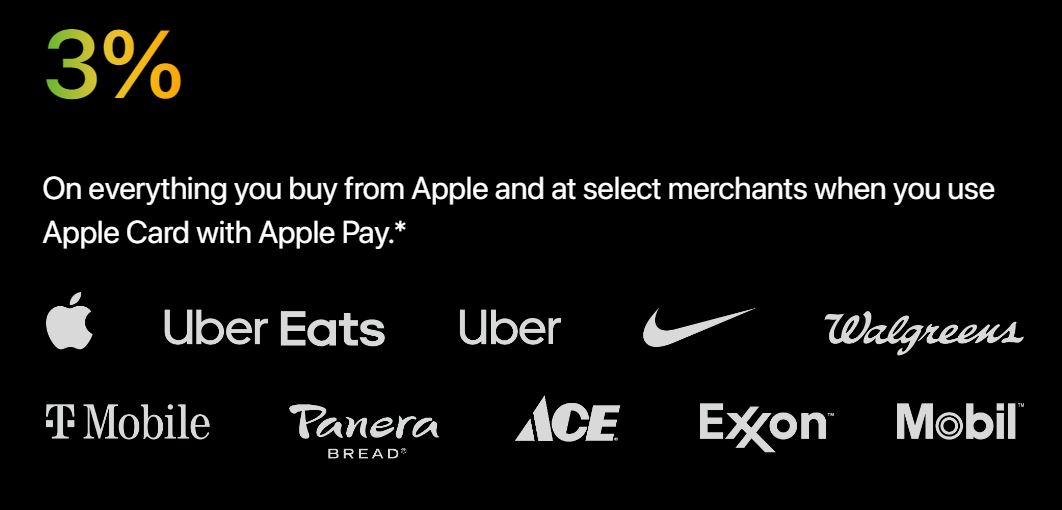Apple Card Review: Should You Get One?
The Apple Card delivers up to 3% cash back and other benefits to the Apple faithful. And they introduced new travel incentives to save more.

Profit and prosper with the best of Kiplinger's advice on investing, taxes, retirement, personal finance and much more. Delivered daily. Enter your email in the box and click Sign Me Up.
You are now subscribed
Your newsletter sign-up was successful
Want to add more newsletters?

Delivered daily
Kiplinger Today
Profit and prosper with the best of Kiplinger's advice on investing, taxes, retirement, personal finance and much more delivered daily. Smart money moves start here.

Sent five days a week
Kiplinger A Step Ahead
Get practical help to make better financial decisions in your everyday life, from spending to savings on top deals.

Delivered daily
Kiplinger Closing Bell
Get today's biggest financial and investing headlines delivered to your inbox every day the U.S. stock market is open.

Sent twice a week
Kiplinger Adviser Intel
Financial pros across the country share best practices and fresh tactics to preserve and grow your wealth.

Delivered weekly
Kiplinger Tax Tips
Trim your federal and state tax bills with practical tax-planning and tax-cutting strategies.

Sent twice a week
Kiplinger Retirement Tips
Your twice-a-week guide to planning and enjoying a financially secure and richly rewarding retirement

Sent bimonthly.
Kiplinger Adviser Angle
Insights for advisers, wealth managers and other financial professionals.

Sent twice a week
Kiplinger Investing Weekly
Your twice-a-week roundup of promising stocks, funds, companies and industries you should consider, ones you should avoid, and why.

Sent weekly for six weeks
Kiplinger Invest for Retirement
Your step-by-step six-part series on how to invest for retirement, from devising a successful strategy to exactly which investments to choose.
We may get compensation if you visit partner links on our site. We may not cover every available offer. Our relationship with advertisers may impact how an offer is presented on our website. However, our selection of products is made independently of our relationship with advertisers.
The Apple Card seems like a sweet deal for the iPhone crowd, with some caveats. To get the greatest value from this credit card, you'll need to pair it with the wallet app called Apple Pay and an Apple device to make purchases, such as an Apple Watch, iPhone or iPad.
In exchange for your fealty to Apple, you get 3% cash back on purchases of Apple and select other products, 2% back on most purchases, and 1% back if you use your card alone, without using Apple Pay. You'll also receive 3% unlimited daily cash when using Booking.com for prepaid travel or making ChargePoint purchases.
By linking your Apple Cash wallet with a high-yield Apple Savings account (with an attractive interest rate of 4.1%), you can start saving your cash back seamlessly at a competitive interest rate.
From just $107.88 $24.99 for Kiplinger Personal Finance
Become a smarter, better informed investor. Subscribe from just $107.88 $24.99, plus get up to 4 Special Issues

Sign up for Kiplinger’s Free Newsletters
Profit and prosper with the best of expert advice on investing, taxes, retirement, personal finance and more - straight to your e-mail.
Profit and prosper with the best of expert advice - straight to your e-mail.
That said, the Apple Card has been grievously mismanaged by Apple and its issuing partner, Goldman Sachs. The Consumer Financial Protection Bureau (CFPB) recently fined the companies $89 million for mishandling Apple Card transaction disputes. The Government agency also cited the companies for misleading iPhone purchasers about interest-free payment options.
So, should you get the Apple Card? I would recommend waiting until Apple unwinds its relationship with Goldman Sachs and institutes better internal safeguards for credit card customers. And though the Apple Card is attractive and extremely popular, it didn't make the cut in Kiplinger's analysis of the best rewards credit cards of 2024. I would instead recommend looking for a cash back or travel rewards credit card that delivers the best bang for your buck.
Apple Card overview
This card is designed for fans of Apple products. When linked with Apple Pay, the card gets 3% cash back from Apple Store and eligible Booking.com and ChargePoint purchases, Uber and other merchants, 2% back at all other merchants that take Apple Pay and 1% back when using the card alone. Cash rewards are deposited daily in an Apple Cash or Apple Savings Account.
Apple Savings account rate: Recently 4.1% APY.
Annual fee: None.
Sign-up bonus: None.
Interest rates: Variable APR of 18.74% to 28.99%.
Pros
- Simplicity. With no points to track or travel miles to redeem, this card can save you time and brain cells.
- Encourages saving. Apple does a good job of helping you save money. When you elect to have cash back deposited in an Apple Savings account, your brain may be less likely to think of the cash as free money to spend. The Apple Savings account recently had an interest rate of 4.1% APY. While there are better high-yield savings accounts available, the rate is still well above the national average.
- No waiting for cash back. It's deposited every day into your Apple Cash or Apple Savings account.
- Travel rewards: If you use your Apple card with Apple Pay on prepaid travel through Booking.com, you earn an unlimited 3% Daily Cash. You'll also earn an unlimited 3% Daily Cash for all ChargePoint purchases.
- Rewards stacking. By combining your Apple Card with Apple Pay and the loyalty programs of participating merchants, you can score some great rewards. For example, get 3% cash back when you buy gas, car washes or convenience items at Exxon Mobil stations and earn Exxon Mobil Rewards+ points, which you can redeem against a future purchase.
- No fees. No annual fee, late fee or foreign transaction fee.
- Happy customers. The Apple Card won Best Co-Branded Credit Card for Customer Satisfaction with No Annual Fee in the J.D. Power 2023 U.S. Credit Card Satisfaction Study. And the Apple Cash payment app won first in its category in the 2024 Kiplinger Readers' Choice Awards.
- Security. The card and payment app are designed for enhanced security.
- Easy on the credit score. You can apply for the card and see your credit limit and interest rate without a hard pull on your credit. If you enroll, however, your credit score will be impacted, as is customary when applying for a card.
Cons
- Failure to follow consumer financial laws. Apple and bank issuer Goldman Sachs were fined $89 million in October 2024 for violations related to the Apple Card. This is a serious issue. Apple will likely improve its internal safeguards to avoid problems like this in the future, but is the card worth taking this gamble?
- No welcome or sign-up bonus. Some of the best credit card bonuses exceed $1,000 and other 2% flat rate cash back cards like Apple Card offer $200 bonuses.
- No purchase protection. Unlike other credit cards, like those in the Visa Signature line, this card does not come with purchase protection (typically 90 to 120 days of insurance against theft or damage, depending on the card). That's a real consideration if you plan to buy a laptop or iPhone with your card for the 3% back rate. iPhones, for example, come with a 90-day warranty. After 90 days, you can buy Apple Care insurance for up to $149 for two years of coverage. Credit cards like the Chase Freedom Flex, on the other hand, offer smartphone coverage up to $600 for free.
- Encourages spending. Yes, we just said that the card can help trick your brain into saving money, but it can also entice you to spend more. That's because people spend more money — almost 10% more on average — when using mobile payments than when paying a physical credit card. This type of "frictionless" payment is just so easy, you don't have as much time to pause and think about your spending.
- Not accepted everywhere. Most merchants accept Apple Pay. However, Walmart, Home Depot, Hobby Lobby, Applebee's and Arby's.
- Uncertain future banking partner. The Apple Card partners with Goldman Sachs, but that relationship soured back in 2023. It's unclear which, if any, financial institution will step in to sponsor the card, or if any rewards rates will change.
Current 3% back partners
Here are the recent merchants that pay 3% back when you pay with your Apple Card with Apple Pay. Note that these partners may change.

Who should get the Apple Card?
The card is best for people who have had an iPhone for a while and are committed to staying within the Apple product ecosystem. Better yet, if your spouse or family are also on iPhones, you can share the card with your family. You can share the card with another adult as a co-owner. And you can sign up anyone aged 13 to adult as a participant (similar to an authorized user). When used thoughtfully, credit cards for teens or young adults can help them build credit and learn the ropes of managing a credit card with some guardrails in place.
Rewards cards dos and don'ts
As with any rewards credit card, be sure to weigh these benefits against fees — although there are happily none in this case — and make sure you understand how to use the card effectively.
In addition, while reward credit cards are great if you use them wisely, always pay them off in full and on time each month to avoid interest, which can dwarf any rewards you earn. Don't change your spending habits to chase credit card rewards. That's a slippery slope that can lead to overspending.
If this is your first foray into credit cards, or you just want a refresher, make sure you know how to choose a credit card. And ensure you understand what counts as a good credit score. You can also use this tool to find the best card for you.
Read More
- Get a Free iPhone 16 Pro With a New Line From Verizon
- Credit Cards That Cover Rental Car Insurance
- Credit Card Bonuses up to $1,600 for New Cardholders
- Best Rewards Credit Cards
- 30 Best Apple Deals Dropping Right Now
As an independent publication dedicated to helping you make the most of your money, the article above is our view of the best deals and is not the opinion of any entity mentioned such as a card issuer, hotel, airline etc. Similarly, the content has not been reviewed or endorsed by any of those entities.
Profit and prosper with the best of Kiplinger's advice on investing, taxes, retirement, personal finance and much more. Delivered daily. Enter your email in the box and click Sign Me Up.

Ellen writes and edits retirement stories. She joined Kiplinger in 2021 as an investment and personal finance writer, focusing on retirement, credit cards and related topics. She worked in the mutual fund industry for 15 years as a manager and sustainability analyst at Calvert Investments. She earned a master’s from U.C. Berkeley in international relations and Latin America and a B.A. from Haverford College.
-
 Stocks Sink With Alphabet, Bitcoin: Stock Market Today
Stocks Sink With Alphabet, Bitcoin: Stock Market TodayA dismal round of jobs data did little to lift sentiment on Thursday.
-
 Betting on Super Bowl 2026? New IRS Tax Changes Could Cost You
Betting on Super Bowl 2026? New IRS Tax Changes Could Cost YouTaxable Income When Super Bowl LX hype fades, some fans may be surprised to learn that sports betting tax rules have shifted.
-
 How Much It Costs to Host a Super Bowl Party in 2026
How Much It Costs to Host a Super Bowl Party in 2026Hosting a Super Bowl party in 2026 could cost you. Here's a breakdown of food, drink and entertainment costs — plus ways to save.
-
 How Much It Costs to Host a Super Bowl Party in 2026
How Much It Costs to Host a Super Bowl Party in 2026Hosting a Super Bowl party in 2026 could cost you. Here's a breakdown of food, drink and entertainment costs — plus ways to save.
-
 3 Reasons to Use a 5-Year CD As You Approach Retirement
3 Reasons to Use a 5-Year CD As You Approach RetirementA five-year CD can help you reach other milestones as you approach retirement.
-
 How to Watch the 2026 Winter Olympics Without Overpaying
How to Watch the 2026 Winter Olympics Without OverpayingHere’s how to stream the 2026 Winter Olympics live, including low-cost viewing options, Peacock access and ways to catch your favorite athletes and events from anywhere.
-
 Here’s How to Stream the Super Bowl for Less
Here’s How to Stream the Super Bowl for LessWe'll show you the least expensive ways to stream football's biggest event.
-
 The Cost of Leaving Your Money in a Low-Rate Account
The Cost of Leaving Your Money in a Low-Rate AccountWhy parking your cash in low-yield accounts could be costing you, and smarter alternatives that preserve liquidity while boosting returns.
-
 This Is How You Can Land a Job You'll Love
This Is How You Can Land a Job You'll Love"Work How You Are Wired" leads job seekers on a journey of self-discovery that could help them snag the job of their dreams.
-
 We Inherited $250K: I Want a Second Home, but My Wife Wants to Save for Our Kids' College.
We Inherited $250K: I Want a Second Home, but My Wife Wants to Save for Our Kids' College.He wants a vacation home, but she wants a 529 plan for the kids. Who's right? The experts weigh in.
-
 4 Psychological Tricks to Save More in 2026
4 Psychological Tricks to Save More in 2026Psychology and money are linked. Learn how you can use this to help you save more throughout 2026.
